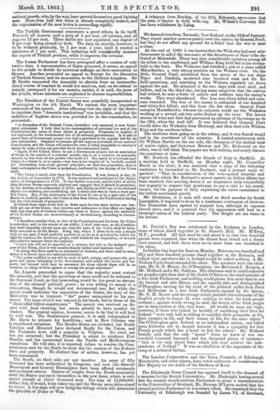The President of the United States was peacefully inaugurated at
Washington on the 4th March. We extract. the most important -sentences of his speech. After affirming that the right of the States to regulate their "domestic institutions' was iiiviolable,,anct that the reddition of fugitive slaves was provided for in' the constitution, he proceeded,:
"A disruption.of the Federal Union, heretofbre only menaced, is now formi- dablyattempted. I hold that in the contemplation of universal law and of the -Constitution the union of these States is perpetual. Perpetuity is implied, if not expressed, in the fundamental law of all national governments. It is safe to assert that no Government proper ever had a provision in its organic law fbr its -own termination. Continue to execute all the express provisions of our national Constitution, and the Union will endure for ever, it being impossible to destroy it .except by some action not provided for in the instrument itself.
"Again, if the United States be not a Government proper, but. an association of States in the nature of a contract merely, can it, as a contract, be peaceably unmade by less than all the parties who made it? One party to a contract may violate it,—break it, so to speak—but does it not require all to lawfully rescind it? Descending from these general principles, we find, the proposition, that in legal contemplation the Union is perpetual, confirmed by the history of the Union itself.
"Time Union is much older than tfirConstitution. It was formed, in fact, by the Articles of Association ill 1774: It was matured and continued in the Decla- ration of Independence in 1776. It was further matured, and the faith of all the then thirteen- States expressly plighted and engaged that it should' be perpetual, by the Attieles,of Confederation in-1778; and, finally,in 1787 one of thedeclarerl objedts tor ordaining and establishing the Constitution was to form a more per- fect Union. But, if the destruction of the Union by one or by a part only of the States be lawfully possible, the Union is less than before, the Constitution having lost the vital element of perpetuity. It follows from- these views that no State upon its own mere motion can law- fully get out of the Union; that resolves and ordinances to that effect are legally void; and that acts of. violence within any State or States against the authority of the United States are insurrectionary or revolutionary, according to circum- stances.
"1 therefore consider that, in view of the Coustitntionand the laws, the Union is unbroken, and; to the extent of my ability, I shall take-care, as the Constitu- tion itself expressly enjoins upon me, that the laws of the Union shall be faith- 'fully executed in all the States. Doing this, which I deem to be only a simple -duty on my part, I shall perfectly perform it, so far as is practicable, unless may rightful masters, the American people, shall withhold the requisition, or in some authoritative manner direct the contrary.
"I trust this will not be regarded as a menace, but only as the declared pup. pose of the Union, that it will constitutionally defend and maintain itself.
In doing this there need be no bloodshed or violauce,,and there shall be none, unless it_ is forced upon the national authority. "The power oonfided to me will be used to hold, occupy, and possess the pro- perty and places belonging to the Government, and collect the. duties and im- posts; but beyond what may be necessary for these objects there will be no invasion, no using of force against or among the people anywhere."
Mr. Lincoln- proceeded to argue that the majority must control the minority, and that the questions at issue could' not be referred to the Supreme Court, as that proceeding would-be too-great an abroga- tion of the citizens' political power ; he was willing to assent to- a convention; though he would not recommend one, but while the people could authorize the separation- of the States, the duty of. the "Axecutive was to transmit "his" power unimpaired to his suc- cessor. The issue of civil war was not in his hands, but in those of his dissatisfied- fellow-countrymen." The speech was received on the spot with loud, cheering, but seems greatly to have puzzled its readers. The general opinion, however, seems to be that it will lead to civil war. The Southerners present, it is said, telegraphed- to Mr. Davis to prepare for hostilities-; and in New Orleans- war is considered imminent. The Border States are irritated, but North Carolina and Missouri have- declared finally for the Union, and the Unionists have still a majority in Virginia. No overt act has yet occurred ; but the President is about to reinforce Fort Sumter, and has summoned home the Pacific and Mediterranean' squadrons. He will also, it is reported, refuse to receive the Com- missioners sent by the South to treat for the cession of the Federal- forts and property. No distinct line of action, however, has yet been annou.nce&
The South, on their side, are not inactive. An army of fifty thousand has been authorized by Congress, and men like General Beauregard and General Henningsen have been offered commands and promised estates. Parties of roughs from the North constantly enter the States and enrol themselves in the new force, which is- esti- mated already at Unity thousand men. The loan of 15,000000 dollars has, it is said, been' taken. up, and the States seem determined' to resist. A few days will' now bringthe tidings which will determine the question of Peace or War. .
A. telegram. from Bombay, of the 27th February, announces that the area of famine is daily wideaing. Mr., Wilson's Currency Bill has been withdrawn by Laing.






























 Previous page
Previous page